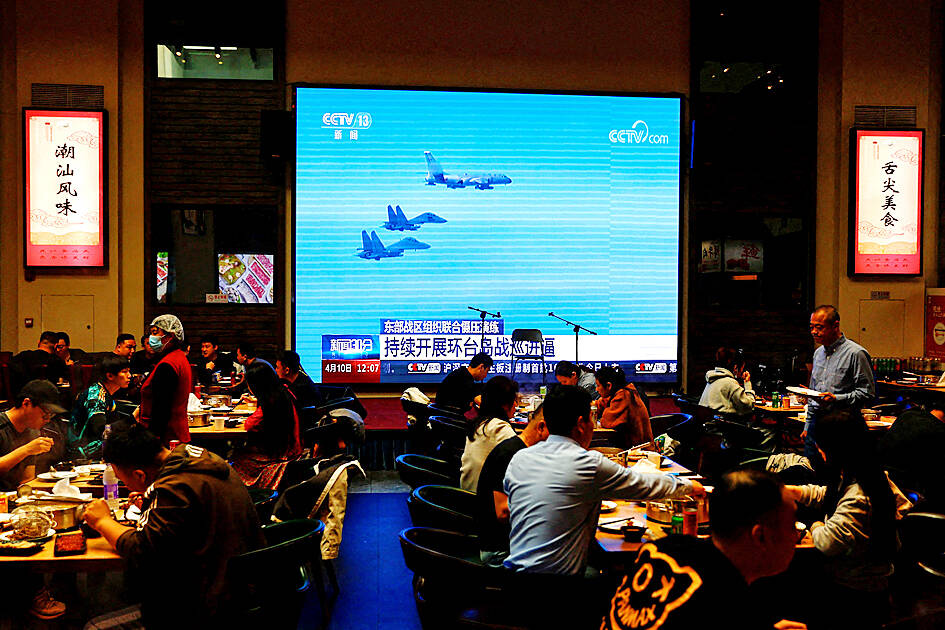A potential crisis across the Taiwan Strait on Thursday was rated as one of the top threats to US interests for the fourth consecutive year by the US Council on Foreign Relations.
The Center for Preventive Action published the results of the Preventive Priorities Survey, which compiled assessments by US foreign policy experts on the likelihood and effects of 30 potential conflicts that could emerge or escalate this year.
A “severe cross-strait crisis” that would affect the US and neighboring countries triggered by Beijing’s increasing economic and military pressure on Taiwan, especially around the nation’s presidential and legislative elections on Saturday next week, was one of the eight contingencies rated as “Tier I (High Priority)” in the report.

Photo: Reuters
The likelihood of such a crisis is “moderate,” but its effect on US interests would be “high,” the report said.
A high impact on US interests refers to a contingency that would directly threaten the US homeland, a defense treaty ally or a vital strategic interest, and “thus is likely to trigger a US military response,” it said.
The annual report rated possible conflicts between the US and China over Taiwan as a “Tier II (Medium Priority)” threat for its assessments in 2019 and 2020.
As tensions between Washington and Beijing intensified and the frequency of Chinese military activities near Taiwan increased, the situation was classified as a “Tier I” risk for the first time in 2021.
The growing risks of armed conflict with Russia and China are “by far the most worrisome” threats to the US, council director Paul Stares said.
“The trend toward less armed conflict around the world since the end of the Cold War is now moving in the opposite direction,” he said.
Three contingencies were rated as highly likely and having a high impact on US interests — “an unprecedented number” since the survey was launched in 2008, the report said.
Among the three, the possibility of growing political polarization leading to acts of domestic terrorism and political violence in the US was listed as the situation of most concern for the first time in 16 years, it said.
The other two were an expansion of the war between Hamas and Israel, and a surge of immigration to the US driven by criminal violence, corruption and economic hardship in Central America and Mexico, it said.
Other Tier I threats — which were all judged to be moderately likely and high-impact — were an escalation of the war in Ukraine, direct military confrontation between Iran and Israel, a highly disruptive cyberattack on critical infrastructure in the US and a security crisis in northeast Asia triggered by North Korea, it said.
The survey was conducted in November last year, receiving about 500 responses from US government officials, foreign policy experts and academics, it said.

PREPAREDNESS: Given the difficulty of importing ammunition during wartime, the Ministry of National Defense said it would prioritize ‘coproduction’ partnerships A newly formed unit of the Marine Corps tasked with land-based security operations has recently replaced its aging, domestically produced rifles with more advanced, US-made M4A1 rifles, a source said yesterday. The unnamed source familiar with the matter said the First Security Battalion of the Marine Corps’ Air Defense and Base Guard Group has replaced its older T65K2 rifles, which have been in service since the late 1980s, with the newly received M4A1s. The source did not say exactly when the upgrade took place or how many M4A1s were issued to the battalion. The confirmation came after Chinese-language media reported

A Ministry of Foreign Affairs official yesterday said that a delegation that visited China for an APEC meeting did not receive any kind of treatment that downgraded Taiwan’s sovereignty. Department of International Organizations Director-General Jonathan Sun (孫儉元) said that he and a group of ministry officials visited Shenzhen, China, to attend the APEC Informal Senior Officials’ Meeting last month. The trip went “smoothly and safely” for all Taiwanese delegates, as the Chinese side arranged the trip in accordance with long-standing practices, Sun said at the ministry’s weekly briefing. The Taiwanese group did not encounter any political suppression, he said. Sun made the remarks when

The Taiwanese passport ranked 33rd in a global listing of passports by convenience this month, rising three places from last month’s ranking, but matching its position in January last year. The Henley Passport Index, an international ranking of passports by the number of designations its holder can travel to without a visa, showed that the Taiwan passport enables holders to travel to 139 countries and territories without a visa. Singapore’s passport was ranked the most powerful with visa-free access to 192 destinations out of 227, according to the index published on Tuesday by UK-based migration investment consultancy firm Henley and Partners. Japan’s and

BROAD AGREEMENT: The two are nearing a trade deal to reduce Taiwan’s tariff to 15% and a commitment for TSMC to build five more fabs, a ‘New York Times’ report said Taiwan and the US have reached a broad consensus on a trade deal, the Executive Yuan’s Office of Trade Negotiations said yesterday, after a report said that Washington is set to reduce Taiwan’s tariff rate to 15 percent. The New York Times on Monday reported that the two nations are nearing a trade deal to reduce Taiwan’s tariff rate to 15 percent and commit Taiwan Semiconductor Manufacturing Co (TSMC, 台積電) to building at least five more facilities in the US. “The agreement, which has been under negotiation for months, is being legally scrubbed and could be announced this month,” the paper said,